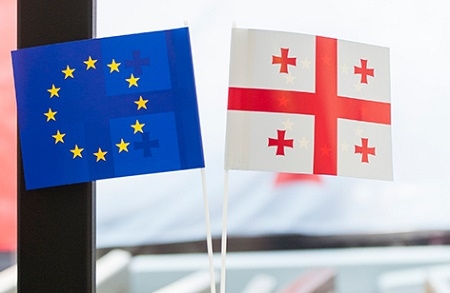EU, Georgia Hold 11th Annual Human Rights Dialogue
The EU and Georgia held the eleventh round of their annual Human Rights Dialogue in Brussels on 25 April 2018. The dialogue allowed for an open, constructive exchange on the human rights situation in Georgia, on the country's commitment to achieving sustainable progress in this area and on the EU's commitments and policy framework for the promotion of Democracy and Human Rights. The dialogue also plays an important role in monitoring of the implementation of the EU-Georgia Association Agreement.
There has been continued progress as regards human rights in Georgia over the past year. The EU took note of the OSCE/ODIHR Electoral Observation Mission’s overall positive report on the October/November 2017 local elections in Georgia and stressed the importance to address shortcomings identified for the effective examination and follow-up of electoral complaints, as well as to further enhance a level playing field. While noting the increasingly free and active media that fostered greater political debates, both the EU and Georgia agreed on the importance of maintaining a free and pluralistic media environment, and political pluralism as a prerequisite for the conduct of democratic elections. The EU encouraged Georgia to increase participation of women and national minority representatives in politics.
The EU reaffirmed its support to the sovereignty and territorial integrity of Georgia within its internationally recognised borders. It reiterated its concerns about the deprivation of life in custody of the Georgian citizen Archil Tatunashvili in Tskhinvali in February and about the overall deterioration of the human rights situation in the Georgian regions of Abkhazia and Tskhinvali region/South Ossetia, in particular with regard to ethnic discrimination, freedom of movement, property rights, and education in mother tongue, as well as about continued obstacles to the rights of internally displaced persons and refugees to a safe and dignified return to their homes. In this worrying context, the EU and Georgia agreed on the imperative of unhindered access of international human rights monitoring mechanisms under international organisations, as well as the EU Monitoring Mission (EUMM) to the Georgian regions of Abkhazia and Tskhinvali region/South Ossetia, and recalled that the Russian Federation has an obligation to implement the EU-mediated 12 August 2008 Ceasefire Agreement. The EU welcomed the new peace initiative of the Georgian Government which can benefit the populations living on both sides of the Administrative Boundary Lines by facilitating trade, education and mobility and fostering people-to-people contacts and confidence building between the divided communities.
The EU encouraged Georgia to continue ensuring the effective implementation of its anti-discrimination law, including in the private sector. The participants stressed their commitment to the universality of human rights for all, regardless of religion or belief, race, sex, language, sexual orientation, gender identity, ability or other. The EU underlined the progress made by Georgia with regard to the protection of ethnic minorities and their civic integration and encouraged the Government to continue taking steps in this regard. The EU expressed the hope that the recent creation of a Human Rights Department in the Ministry of Internal Affairs will enhance the effective response to hate crimes in Georgia and encouraged the Government to further operationalise its human rights coordination mechanism.
The EU welcomed initiatives taken by Georgia aimed at implementing commitments stemming from the Istanbul Convention preventing and combating violence against women and domestic violence. The participants of the Dialogue agreed on the need to further improve national institutional capacities in support of gender issues. In particular, the EU encouraged Georgia to continue enhancing measures to prevent and investigate cases of violence against women and girls and protect the victims.
The EU acknowledged the adoption of the Law on Occupational Safety, while noting that further efforts are needed to ensure that the labour inspectorate becomes fully-fledged and that the new law is gradually applied across all economic sectors. The EU encouraged Georgia to enhance its social dialogue and to continue to work closely with the International Labour Organisation.
The EU noted progress in addressing the situation of vulnerable children and children in poverty and invited the authorities to increase efforts to improve the quality of primary health care to pregnant women and newly born children.
Georgia has also made considerable progress in preventing torture and ill-treatment, and the EU stressed the need for this progress to be consolidated. The EU encouraged Georgia to continue to work on the establishment of an independent and impartial investigative mechanism for the investigation of alleged cases of violation of human rights and freedoms committed by representatives of law enforcement agencies.
The EU reiterated its appreciation for the civil society’s involvement in the process that led to the appointment of the Public Defender in December 2017.
The parties also agreed to continue and further develop their good cooperation on human rights related matters in multilateral fora, such as the UN, OSCE and the Council of Europe.
The EU inquired about the state of play of the investigation into the Afghan Mukhtarli case and encouraged to continue ensuring a safe and secured environment for human rights defenders residing in Georgia.
In line with its policy of consulting civil society ahead of its meetings on human rights, the EU met with representatives of Georgian and international NGOs prior to the dialogue as well as with representatives of international and regional organisations active in Georgia.
The EU delegation was led by Mr Dirk Schuebel, Head of Division for Eastern Partnership bilateral relations in the European External Action Service, while the Georgian delegation was headed by Mr Vakhtang Makharoblishvili, Deputy Minister of Foreign Affairs. The dialogue took place back-to-back with the Justice, Freedom and Security Subcommittee meeting on 24 April. The next Human Rights Dialogue between the EU and Georgia is scheduled to take place in Tbilisi in 2019.












